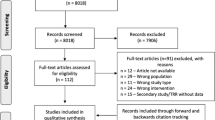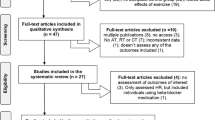Abstract
Evidence concerning the prescription of isolated resistance training (RT) to hypertensive individuals is limited. Guidelines are divergent concerning RT inclusion for prehypertensive and hypertensive persons. A meta-analysis investigating data with larger sample sizes provides more robust effect size estimates and allows for inferences on clinical choices concerning the effectiveness of RT alone. In this context, the aim of this meta-analysis was to assess the effects of RT alone on the systolic (SBP) and diastolic (DBP) blood pressures in prehypertensive and hypertensive individuals. Data from 13 studies involving 417 participants (207 assigned to RT and 210 controls) were obtained. The results indicate significant reductions in SBP (−6.16 mmHg CI −8.27 to −4.04; I2: 31.0% P value for heterogeneity = 0.136 and effect size = −0.59) and DBP (−3.70 mmHg CI −5.19 to −2.21; I2: 18.3% P value for heterogeneity = 0.106 and effect size = −0.55) when compared to control groups. In conclusion, RT alone is able to reduce SBP and DBP in prehypertensive and hypertensive subjects, especially in elderly individuals.
This is a preview of subscription content, access via your institution
Access options
Subscribe to this journal
Receive 12 digital issues and online access to articles
$119.00 per year
only $9.92 per issue
Buy this article
- Purchase on Springer Link
- Instant access to full article PDF
Prices may be subject to local taxes which are calculated during checkout





Similar content being viewed by others
Change history
05 August 2021
A Correction to this paper has been published: https://doi.org/10.1038/s41371-021-00590-9
References
Whelton PK, Carey RM, Aronow WS, Casey DE, Collins KJ, Dennison Himmelfarb C, et al. 2017 ACC/AHA/AAPA/ABC/ACPM/AGS/APhA/ASH/ASPC/NMA/PCNA guideline for the prevention, detection, evaluation, and management of high blood pressure in adults: executive summary: a report of the American college of cardiology/American heart association task force on clinical practice guidelines. Hypertension. 2018;71:1269–324.
Lim SS, Vos T, Flaxman AD, Danaei G, Shibuya K, Adair-Rohani H, et al. A comparative risk assessment of burden of disease and injury attributable to 67 risk factors and risk factor clusters in 21 regions, 1990–2010: a systematic analysis for the Global Burden of Disease Study 2010. Lancet. 2012;380:2224–60.
World Health Organization. Hypertension 2019. https://www.who.int/news-room/fact-sheets/detail/hypertension. Accessed 13 Sept 2019.
Malachias MVB, Souza WKSB. PF. 7 TH Brazilian guideline of arterial hypertension. Arq Bras Cardiol. 2016;107:1–83.
Naci H, Salcher-Konrad M, Dias S, Blum MR, Sahoo SA, Nunan D, et al. How does exercise treatment compare with antihypertensive medications? A network meta-analysis of 391 randomised controlled trials assessing exercise and medication effects on systolic blood pressure. Br J Sports Med. 2019;53:859–69.
Valenzuela PL, Carrera-Bastos P, Gálvez BG, Ruiz-Hurtado G, Ordovas JM, Ruilope LM, et al. Lifestyle interventions for the prevention and treatment of hypertension. Nat Rev Cardiol. 2021;4:251–75.
Artero EG, Lee D, Ruiz JR, Sui X, Ortega FB, Church TS, et al. A prospective study of muscular strength and all-cause mortality in men with hypertension. J Am Coll Cardiol. 2011;57:1831–7.
Fragala MS, Cadore EL, Dorgo S, Izquierdo M, Kraemer WJ, Peterson MD, et al. Resistance training for older adults: position statement from the national strength and conditioning association. J Strength Cond Res. 2019;33:2019–52.
Westcott WL. Resistance training is medicine: effects of strength training on health. Curr Sports Med Rep. 2012;11:209–16.
de Sousa EC, Abrahin O, Ferreira ALL, Rodrigues RP, Alves EAC, Vieira RP. Resistance training alone reduces systolic and diastolic blood pressure in prehypertensive and hypertensive individuals: meta-analysis. Hypertens Res. 2017;40:927–31.
Moher D, Shamseer L, Clarke M, Ghersi D, Liberati A, Petticrew M, et al. Preferred reporting items for systematic review and meta-analysis protocols (PRISMA-P) 2015 statement. Syst Rev. 2015;4:1.
Smart NA, Way D, Carlson D, Millar P, McGowan C, Swaine I, et al. Effects of isometric resistance training on resting blood pressure: individual participant data meta-analysis. J Hypertens. 2019;37:1927–38.
Son W-M, Pekas EJ, Park S-Y. Twelve weeks of resistance band exercise training improves age-associated hormonal decline, blood pressure, and body composition in postmenopausal women with stage 1 hypertension: a randomized clinical trial. Menopause. 2020;27:199–207.
Terra DF, Mota MR, Rabelo HT, Bezerra LMA, Lima RM, Ribeiro AG, et al. Reduction of arterial pressure and double product at rest after resistance exercise training in elderly hypertensive women. Arq Bras Cardiol. 2008;91:299–305.
Park Y-H, Song M, Cho B-L, Lim J-Y, Song W, Kim S-H. The effects of an integrated health education and exercise program in community-dwelling older adults with hypertension: a randomized controlled trial. Patient Educ Couns. 2011;82:133–7.
Mota MR, de Oliveira RJ, Dutra MT, Pardono E, Terra DF, Lima RM, et al. Acute and chronic effects of resistive exercise on blood pressure in hypertensive elderly women. J Strength Cond Res. 2013;27:3475–380.
Heffernan KS, Yoon ES, Sharman JE, Davies JE, Shih Y-T, Chen C-H, et al. Resistance exercise training reduces arterial reservoir pressure in older adults with prehypertension and hypertension. Hypertens Res. 2013;36:422–7.
Beck DT, Casey DP, Martin JS, Emerson BD, Braith RW. Exercise training improves endothelial function in young prehypertensives. Exp Biol Med. 2013;238:433–41.
Dantas FFO, Brasileiro-Santos M, do S, Batista RMF, do Nascimento LS, Castellano LRC, et al. Effect of strength training on oxidative stress and the correlation of the same with forearm vasodilatation and blood pressure of hypertensive elderly women: a randomized clinical trial. PLoS ONE. 2016;11:e0161178.
Bertani RF, Campos GO, Perseguin DM, Bonardi JMT, Ferriolli E, Moriguti JC, et al. Resistance exercise training is more effective than interval aerobic training in reducing blood pressure during sleep in hypertensive elderly patients. J Strength Cond Res. 2018;32:2085–90.
Tomeleri CM, Marcori AJ, Ribeiro AS, Gerage AM, Padilha C, de S, et al. Chronic blood pressure reductions and increments in plasma nitric oxide bioavailability. Int J Sports Med. 2017;38:290–9.
Ruangthai R, Phoemsapthawee J. Combined exercise training improves blood pressure and antioxidant capacity in elderly individuals with hypertension. J Exerc Sci Fit. 2019;17:67–76.
Boeno FP, Ramis TR, Munhoz SV, Farinha JB, Moritz CEJ, Leal-Menezes R, et al. Effect of aerobic and resistance exercise training on inflammation, endothelial function and ambulatory blood pressure in middle-aged hypertensive patients. J Hypertens. 2020;38:2501–9.
Polito MD, Papst R, Goessler K. Twelve weeks of resistance training performed with different number of sets: effects on maximal strength and resting blood pressure of individuals with hypertension. Clin Exp Hypertens. 2021;2:164–8.
Schroeder EC, Franke WD, Sharp RL, Lee Dchul. Comparative effectiveness of aerobic, resistance, and combined training on cardiovascular disease risk factors: a randomized controlled trial. PLoS ONE. 2019;14:e0210292.
Leung AA, Nerenberg K, Daskalopoulou SS, McBrien K, Zarnke KB, Dasgupta K, et al. Hypertension Canada’s 2016 Canadian hypertension education program guidelines for blood pressure measurement, diagnosis, assessment of risk, prevention, and treatment of hypertension. Can J Cardiol. 2016;32:569–88.
Vale AF, Carneiro JA, Jardim PCV, Jardim TV, Steele J, Fisher JP, et al. Acute effects of different resistance training loads on cardiac autonomic modulation in hypertensive postmenopausal women. J Transl Med. 2018;16:240.
Oliveira-Dantas FF, Brasileiro-Santos M, do S, Thomas SG, Silva AS, Silva DC, et al. Short-term resistance training improves cardiac autonomic modulation and blood pressure in hypertensive older women: a randomized controlled trial. J Strength Cond Res. 2020;34:37–45.
Barboza CA, Souza GIH, Oliveira JCMF, Silva LM, Mostarda CT, Dourado PMM, et al. Cardioprotective properties of aerobic and resistance training against myocardial infarction. Int J Sports Med. 2016;37:421–30.
Ruiz JR, Sui X, Lobelo F, Morrow JRJ, Jackson AW, Sjöström M, et al. Association between muscular strength and mortality in men: prospective cohort study. BMJ. 2008;337:a439.
Cornelissen VA, Smart NA. Exercise training for blood pressure: a systematic review and meta-analysis. J Am Heart Assoc. 2013;2:e004473.
Funding
The authors have not declared a specific grant for this research from any funding agency in the public, commercial, or not-for-profit sectors.
Author information
Authors and Affiliations
Corresponding author
Ethics declarations
Competing interests
The authors declare no competing interests.
Additional information
Publisher’s note Springer Nature remains neutral with regard to jurisdictional claims in published maps and institutional affiliations.
The original online version of this article was revised: Due to an error in figure 5.
Rights and permissions
About this article
Cite this article
Abrahin, O., Moraes-Ferreira, R., Cortinhas-Alves, E.A. et al. Is resistance training alone an antihypertensive therapy? A meta-analysis. J Hum Hypertens 35, 769–775 (2021). https://doi.org/10.1038/s41371-021-00582-9
Received:
Revised:
Accepted:
Published:
Issue Date:
DOI: https://doi.org/10.1038/s41371-021-00582-9



